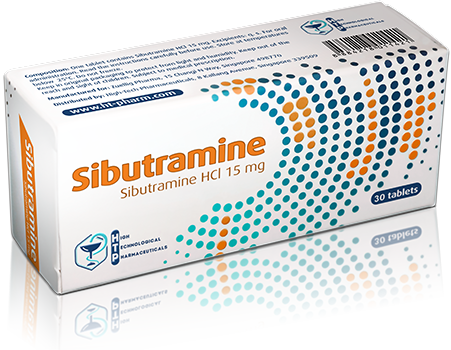Indication:
Sibutramine is indicated for the management of obesity, including weight loss and maintenance of weight loss, and should be used in conjunction with a reduced calorie diet. Sibutramine is recommended for obese patients with an initial body mass index ≥ 30 kg/m², or ≥ 27 kg/m² in the presence of other risk factors (e.g., diabetes, dyslipidemia, controlled hypertension).
Contraindications:
Sibutramine is contraindicated in patients:
- with a history of coronary artery disease (e.g., angina, history of myocardial infarction), congestive heart failure, tachycardia, peripheral arterial occlusive disease, arrhythmia or cerebrovascular disease (stroke or transient ischemic attack (TIA)).
- with inadequately controlled hypertension > 145/90 mm Hg.
- over 65 years of age.
- receiving monoamine oxidase inhibitors (MAOIs).
- with hypersensitivity to sibutramine or any of the inactive ingredients of Sibutramine.
- who have a major eating disorder (anorexia nervosa or bulimia nervosa).
- taking other centrally acting weight loss drugs.
Administration:
The recommended starting dose of Sibutramine is 15 mg administered once daily with or without food. If there is inadequate weight loss, the dose may be titrated after four weeks to a total of 20 mg once daily. The 10 mg dose should be reserved for patients who do not tolerate the 15 mg dose. Blood pressure and heart rate changes should be taken into account when making decisions regarding dose titration.
Doses above 15 mg daily are not recommended. In most of the clinical trials, Sibutramine) was given in the morning.
Precautions:
Certain centrally-acting weight loss agents that cause release of serotonin from nerve terminals have been associated with pulmonary hypertension (PPH), a rare but lethal disease. In premarketing clinical studies, no cases of PPH have been reported with sibutramine tablets. Because of the low incidence of this disease in the underlying population, however, it is not known whether or not Sibutramine (sibutramine hydrochloride monohydrate) may cause this disease.
Side effects:
Get emergency medical help if you have any of these signs of an allergic reaction: hives; difficult breathing; swelling of your face, lips, tongue, or throat.
Stop using sibutramine and call your doctor at once if you have a serious side effect such as:
- fast, pounding, or uneven heartbeats;
- new or worsening shortness of breath;
- agitation, hallucinations, fever, tremor, overactive reflexes, nausea, vomiting, diarrhea, loss of coordination, dilated pupils;
- very stiff (rigid) muscles, high fever, sweating, confusion, feeling like you might pass out;
- easy bruising or bleeding (nosebleeds, bleeding gums, or any bleeding that will not stop);
- dangerously high blood pressure (severe headache, blurred vision, buzzing in your ears, anxiety, seizure);
- chest pain or heavy feeling, pain spreading to the arm or shoulder, general ill feeling;
- sudden numbness or weakness (especially on one side of the body), problems with vision, speech, or balance.
Less serious side effects may include:
- dry mouth, upset stomach;
- changes in appetite;
- constipation, stomach pain;
- headache, back pain, joint pain;
- feeling nervous, dizzy, or depressed;
- flu symptoms, runny or stuffy nose, sore throat, cough;
- warmth, redness, or tingly feeling under your skin;
- trouble sleeping (insomnia);
- mild skin rash.
This is not a complete list of side effects and others may occur. Call your doctor for medical advice about side effects.
Overdosage:
In case, an overdose with Sibutramine happened seek emergency help.
View Product